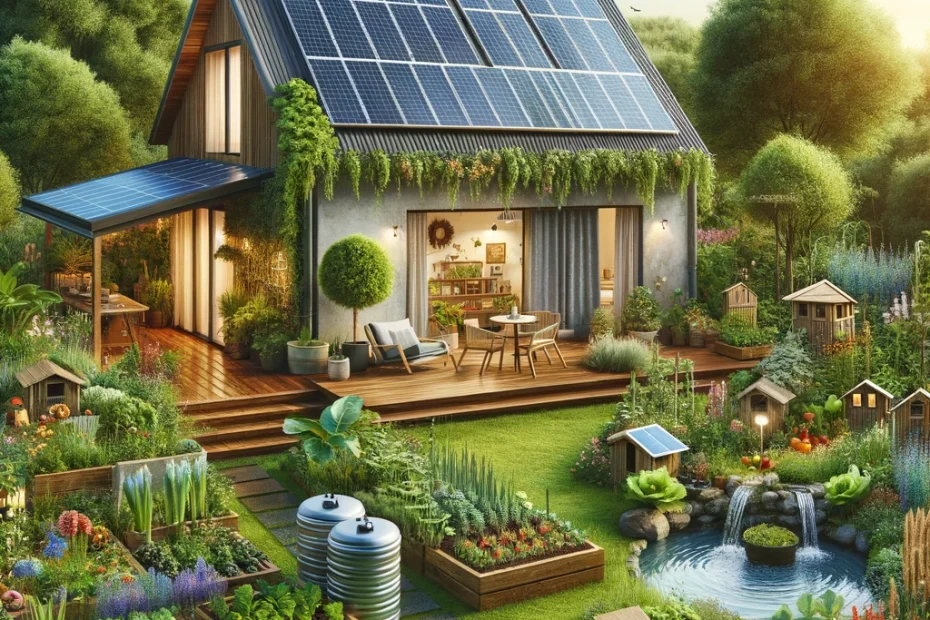Eco-Friendly Living: Tips for a Sustainable Home and Garden promises to transform your living space into a beacon of sustainability. In today’s world, where the environment faces unprecedented challenges, every individual’s efforts towards eco-friendly living can make a significant difference. This article delves into practical and innovative strategies to make your home and garden more sustainable, offering a comprehensive guide to those who wish to contribute positively to the planet while enjoying the tranquility of a green living space.
Eco-Friendly Living
Eco-friendly living goes beyond the mere reduction of waste. It encompasses a holistic approach to reducing your carbon footprint, conserving resources, and nurturing a healthier environment for all. Incorporating sustainable practices into your daily life not only benefits the planet but also enhances your well-being and can lead to financial savings.
Sustainable Home Design
Creating a sustainable home starts with thoughtful design and construction. Utilize energy-efficient materials and technologies, such as solar panels and LED lighting, to minimize energy consumption. Insulating your home effectively can reduce the need for heating and cooling, further decreasing your environmental impact.
Energy Efficiency at Home
Energy efficiency is pivotal in eco-friendly living. Simple changes, such as switching to energy-efficient appliances, using smart thermostats, and adopting habits like turning off lights when not in use, can significantly reduce your energy footprint. Renewable energy sources, such as solar or wind power, offer a clean alternative to fossil fuels.
Water Conservation Techniques
Water is a precious resource that requires careful management. Implementing water-saving devices, fixing leaks promptly, and adopting water-wise gardening practices can greatly reduce your water usage. Collecting rainwater for garden irrigation is an effective way to conserve water and support a lush, green garden.
Sustainable Gardening Practices
Sustainable gardening is about creating an eco-friendly oasis in your backyard. Choosing native plants, practicing organic gardening, and promoting biodiversity are key components. Composting organic waste not only reduces landfill contribution but also enriches the soil, supporting healthier plant growth.
Reducing, Reusing, and Recycling
The principles of reducing, reusing, and recycling are foundational to eco-friendly living. Minimize waste by opting for reusable products, recycling materials whenever possible, and repurposing items creatively. These practices not only reduce your environmental footprint but also encourage a minimalist and meaningful lifestyle.
Green Cleaning Solutions
Switching to green cleaning products eliminates the use of harmful chemicals in your home, protecting both your health and the environment. Many eco-friendly cleaning solutions can be made from common household ingredients, offering an effective, natural, and cost-effective alternative to conventional cleaning products.
Community Involvement and Education
Promoting eco-friendly living extends beyond individual actions. Getting involved in community initiatives, educating others about the importance of sustainability, and supporting policies that protect the environment are vital steps in fostering a broader impact.
FAQs
What are the first steps towards eco-friendly living?
Start by assessing your current environmental impact and identifying areas for improvement. Simple actions, such as reducing energy and water usage, can have immediate effects.
Can eco-friendly practices really save money?
Yes, many sustainable practices lead to financial savings, such as lower energy bills through efficient appliances and reduced water usage through conservation techniques.
How can I make my garden more sustainable?
Adopting organic gardening practices, using native plants, and implementing water conservation methods can make your garden more eco-friendly.
Are green cleaning products as effective as traditional ones?
Yes, many natural cleaning solutions are equally effective at cleaning and disinfecting, without the harmful environmental impact.
How can I involve my community in eco-friendly practices?
Organize local clean-up events, start a community garden, or host educational workshops to spread awareness about sustainable living.
Conclusion
Embracing eco-friendly living is not just a trend but a necessary shift towards a more sustainable and responsible lifestyle. By adopting the strategies outlined in this article, individuals can make a tangible difference in their environmental impact, contributing to a healthier planet for future generations. Remember, the journey towards eco-friendliness begins with small, conscious decisions that collectively lead to significant environmental benefits.
